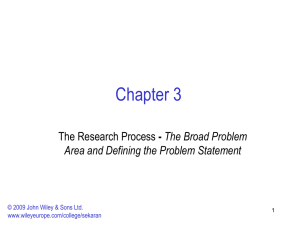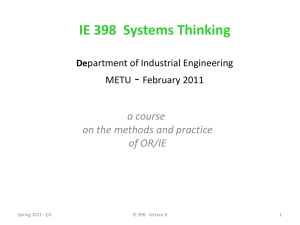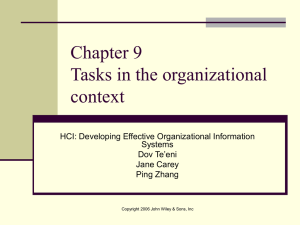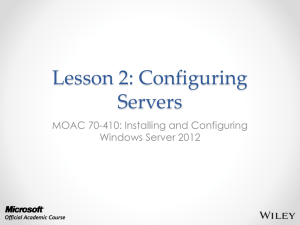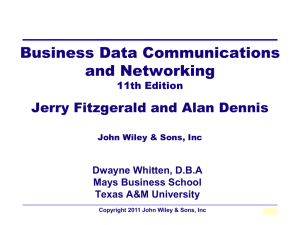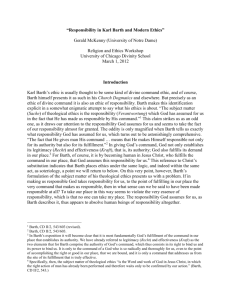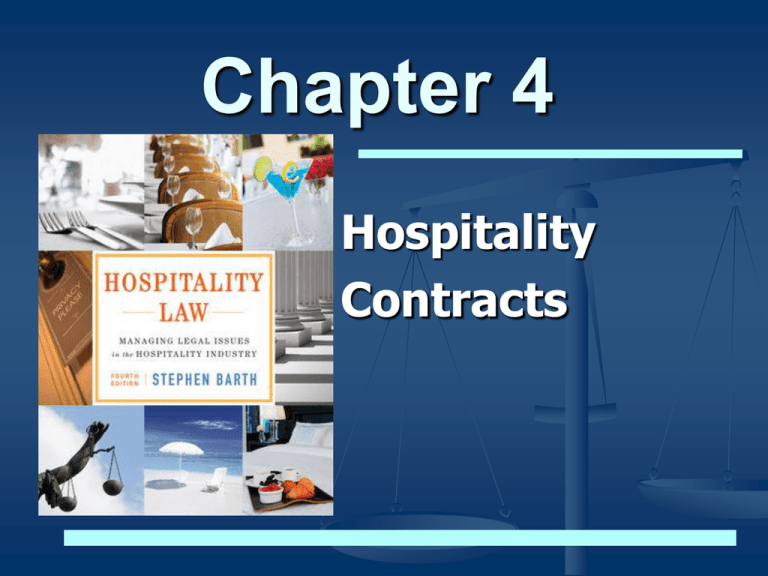
Chapter 4
Hospitality
Contracts
Hospitality Contracts
Introduction to Contracts
Components of Hospitality Contracts
The Uniform Commercial Code (UCC)
Preventative Legal Management and
Contracts
© 2012 Stephen C. Barth P.C. and John Wiley & Sons, Inc.
All Rights Reserved
In This Chapter, You Will Learn:
1.
2.
3.
4.
5.
The two basic types of valid business contracts.
The four essential components that must be
present to create a valid contract.
The purpose of the Uniform Commercial Code
(UCC).
The consequences of breaching an enforceable
contract.
How to avoid legal difficulties related to
contracts before they arise.
© 2012 Stephen C. Barth P.C. and John Wiley & Sons, Inc.
All Rights Reserved
Introduction to Contracts
Legalese:
Plaintiff - The person or entity that
initiates litigation against another.
Sometimes also referred to as the
claimant, petitioner, or applicant.
© 2012 Stephen C. Barth P.C. and John Wiley & Sons, Inc.
All Rights Reserved
Introduction to Contracts
Legalese:
Defendant - The person or entity against
which litigation is initiated. Sometimes
referred to as the respondent.
© 2012 Stephen C. Barth P.C. and John Wiley & Sons, Inc.
All Rights Reserved
Analyze the Situation 4.1
In response to a telephone inquiry,
Vincent's Tree Service offered to trim an
apple tree on the lawn outside the front
lobby of the Olde Tyme Prime Rib
restaurant, for a fee of $500. Mr. Wilbert,
the restaurant's manager, agreed to the
price and a start date of Monday.
© 2012 Stephen C. Barth P.C. and John Wiley & Sons, Inc.
All Rights Reserved
Analyze the Situation 4.1
At noon on Monday, Vincent's informed Mr.
Wilbert that the job was completed. The tree
trimming went fine, but a large amount of
branches and leaves from the tree were left
neatly piled near the tree's base. When Mr.
Wilbert inquired about the removal of the debris,
Vincent's stated that removing the debris had
never been discussed, and was not included in
the quoted price.
© 2012 Stephen C. Barth P.C. and John Wiley & Sons, Inc.
All Rights Reserved
Analyze the Situation 4.1
Mr. Wilbert agreed that the topic of removal
was never discussed, but stated that it is
generally assumed that when a company trims
a tree, it will remove the brush it generates;
therefore, he refused to pay until the brush
was removed.
© 2012 Stephen C. Barth P.C. and John Wiley & Sons, Inc.
All Rights Reserved
Analyze the Situation 4.1
1.
2.
Which party's argument seems valid? Why?
How would you suggest the issue be resolved
between these two contracting parties?
© 2012 Stephen C. Barth P.C. and John Wiley & Sons, Inc.
All Rights Reserved
Analyze the Situation 4.2
Jeremy Moss’s credit card was billed
$450.00 by the Langford Inn. The charge was
a “no-show” charge that resulted from Mr.
Moss not arriving at the hotel on a night that
“he” had reserved, via the hotel’s Web site,
two rooms (at $225.00 each). The hotel had
been sold out that night, and the rooms, in
keeping with hotel policy, had been held for Mr.
Moss until 4:00 A.M. the next morning.
© 2012 Stephen C. Barth P.C. and John Wiley & Sons, Inc.
All Rights Reserved
Analyze the Situation 4.2
Mr. Moss contacts the hotel when he receives
his credit card statement and protests that he
never made the reservations. The reservation
data collected on the Web site lists Mr. Moss’s
actual address and his home telephone
number as well as the credit card number
billed by the hotel. Mr. Moss, however, still
maintains that he did not make the reservation,
and thus demands that the “no-show” billing
be removed from his card.
© 2012 Stephen C. Barth P.C. and John Wiley & Sons, Inc.
All Rights Reserved
Analyze the Situation 4.2
1.
2.
Do you believe the hotel is justified in
charging Mr. Moss for the no-shows?
How could this hotel prevent such
misunderstandings in the future?
© 2012 Stephen C. Barth P.C. and John Wiley & Sons, Inc.
All Rights Reserved
Components of an Enforceable
Contract
Legalese:
Enforceable Contract - A contract
recognized as valid by the courts and
subject to the court’s ability to compel
compliance with its terms.
© 2012 Stephen C. Barth P.C. and John Wiley & Sons, Inc.
All Rights Reserved
Components of an Enforceable
Contract
Legalese:
Offer – A proposal to perform an act or to
pay an amount that, if accepted,
constitutes a legally valid contract.
© 2012 Stephen C. Barth P.C. and John Wiley & Sons, Inc.
All Rights Reserved
Components of an Enforceable
Contract
Legalese:
Acceptance - Unconditional agreement to
the precise terms and conditions of an
offer.
© 2012 Stephen C. Barth P.C. and John Wiley & Sons, Inc.
All Rights Reserved
Components of an Enforceable
Contract
Legalese:
Consideration - The payment exchanged
for the promise(s) contained in a
contract.
© 2012 Stephen C. Barth P.C. and John Wiley & Sons, Inc.
All Rights Reserved
Components of an Enforceable
Contract
Legalese:
Express Contract – A contract in which the
components of the agreement are
explicitly stated, either orally or
written.
© 2012 Stephen C. Barth P.C. and John Wiley & Sons, Inc.
All Rights Reserved
Analyze the Situation 4.3
JoAnna Hart was offered a position as
Director of Foodservice for the
independent school district of Laingsford.
She received a written offer of
employment on the first of the month,
with a stipulation that the offer would be
in effect until the fifteenth of the month.
© 2012 Stephen C. Barth P.C. and John Wiley & Sons, Inc.
All Rights Reserved
Analyze the Situation 4.3
If Ms. Hart were to accept the employment
offer, she would have to sign the employment
contract, and return it to the Laingsford
Superintendent of Schools before the offer
expired on the fifteenth.
Upon reading the details of the contract, Ms.
Hart felt that the salary identified in the letter
was too low, and thus she adjusted it upward by
$5,000, initialing her change on the contract
copy.
© 2012 Stephen C. Barth P.C. and John Wiley & Sons, Inc.
All Rights Reserved
Analyze the Situation 4.3
She then returned the offer letter to the
Schools Superintendent with a cover letter,
stating she was pleased to accept the
position as detailed in the contract. The
contract arrived by mail in the office of the
superintendent on the fourteenth of the
month, at which time, the Superintendent
called Ms. Hart to express his regret that
she had rejected the employment offer.
© 2012 Stephen C. Barth P.C. and John Wiley & Sons, Inc.
All Rights Reserved
Analyze the Situation 4.3
During the telephone call, Ms. Hart
realized that the Superintendent would
not accept her salary revision proposal,
so instead she verbally accepted the
position at the original rate of pay. The
Superintendent, however, declined her
acceptance, stating that the original
employment offer no longer existed.
© 2012 Stephen C. Barth P.C. and John Wiley & Sons, Inc.
All Rights Reserved
Analyze the Situation 4.3
1.
Does the school have the legal right to
withdraw its offer of employment? Why
or why not?
© 2012 Stephen C. Barth P.C. and John Wiley & Sons, Inc.
All Rights Reserved
Search the Web 4.1
Log on to the Internet and enter:
www.yahoo.com.
1.
Under Search, type “hospitality contracts.”
2.
Search for stories related to contracts and
contract negotiations that are making
headlines in the news, nationally or in your
area.
3.
Print out one of the articles and be prepared to
summarize it in class.
© 2012 Stephen C. Barth P.C. and John Wiley & Sons, Inc.
All Rights Reserved
The Uniform Commercial Code
(UCC)
Legalese:
Uniform Commercial Code (UCC) - A model
statute covering things such as the sale of
goods, credit, and bank transactions. All
states have adopted the UCC, with the
exception of Louisiana.
© 2012 Stephen C. Barth P.C. and John Wiley & Sons, Inc.
All Rights Reserved
Introduction to Hospitality
Contracts
Legalese:
Caveat Emptor – A Latin phrase meaning “let
the buyer beware.” The phrase implies that
the burden of determining the relative
quality and price of a product falls to the
buyer, not the seller.
© 2012 Stephen C. Barth P.C. and John Wiley & Sons, Inc.
All Rights Reserved
The Uniform Commercial Code
(UCC)
1.
2.
3.
To simplify, clarify and modernize the law
governing commercial transactions.
To permit the continued expansion of
commercial transactions.
To provide for consistency in the law regarding
the sale and financing of personal property in
the various jurisdictions (municipalities,
counties and states).
© 2012 Stephen C. Barth P.C. and John Wiley & Sons, Inc.
All Rights Reserved
Analyze the Situation 4.4
The Smoking Bones BBQ restaurant
serves an excellent spinach salad as an
accompaniment to its popular chicken
and rib dishes. Michelle Brennan, the
restaurant’s manager, purchases, from a
local vendor, all of her produce, including
fresh spinach used in the salads.
© 2012 Stephen C. Barth P.C. and John Wiley & Sons, Inc.
All Rights Reserved
Analyze the Situation 4.4
Unfortunately, one of Michelle’s guests
becomes ill after eating at her restaurant. The
source of the illness is traced directly to the
fresh spinach used in the restaurant’s salads.
In fact, upon further investigation, it is
determined that the spinach, when delivered
to the restaurant’s produce vendor, was
already infected with E. coli bacteria that
matched a strain identified in cattle manure
used to fertilize the spinach field.
© 2012 Stephen C. Barth P.C. and John Wiley & Sons, Inc.
All Rights Reserved
Analyze the Situation 4.4
1.
2.
3.
According to the UCC, a seller has a
responsibility not to sell defective products.
Who, in this example, is the seller?
Assume that you were the guest sickened by
the bacteria. Who do you believe should be
held responsible for the damages you
incurred?
What specific steps could Michele take to help
prevent incidents such as the one described
here from reoccurring in her restaurant?
© 2012 Stephen C. Barth P.C. and John Wiley & Sons, Inc.
All Rights Reserved
Breach of Contract
Legalese:
Breach of Contract - Failure to keep the
promises or agreements of a contract.
© 2012 Stephen C. Barth P.C. and John Wiley & Sons, Inc.
All Rights Reserved
Preventative Legal
Management and Contracts
Legalese:
Damages - Losses or costs incurred due to
another’s wrongful act.
© 2012 Stephen C. Barth P.C. and John Wiley & Sons, Inc.
All Rights Reserved
Remedies and Consequences of
Breaching an Enforceable Contract
1.
2.
3.
4.
Suit for specific performance.
Liquidated damages.
Economic loss.
Alternative dispute resolution.
© 2012 Stephen C. Barth P.C. and John Wiley & Sons, Inc.
All Rights Reserved
Remedies and Consequences of
Breaching an Enforceable Contract
Legalese:
Arbitration - A process in which an agreedupon, independent, neutral third party
(the arbitrator), renders a final and
binding resolution to a dispute. The
decision of the arbitrator is known as
the “award.”
© 2012 Stephen C. Barth P.C. and John Wiley & Sons, Inc.
All Rights Reserved
Remedies and Consequences of
Breaching an Enforceable Contract
Legalese:
Mediation - A process in which an appointed,
neutral third party (the mediator), assists
those involved in a dispute with resolving
their own differences. The result of
mediation, when successful, is known as the
“settlement.”
© 2012 Stephen C. Barth P.C. and John Wiley & Sons, Inc.
All Rights Reserved
Statute of Limitations
Legalese:
Statute of Limitations - Various laws that set
maximum time periods in which lawsuits
must be initiated. If the suit is not initiated
(or filed) before the expiration of the
maximum period allowed, then the law
prohibits the use of the courts for recovery.
© 2012 Stephen C. Barth P.C. and John Wiley & Sons, Inc.
All Rights Reserved
Preventing Breach of Contract
1.
2.
3.
4.
5.
Get it in writing.
Read the contract thoroughly.
Keep copies of all contract documents.
Use good faith when negotiating
contracts.
Note and calendar time deadlines for
performance.
© 2012 Stephen C. Barth P.C. and John Wiley & Sons, Inc.
All Rights Reserved
Preventing Breach of Contract
6.
7.
8.
Ensure the performance of third parties.
Share contract information with those
who need to know, and educate staff on
the consequences of contract breach.
Resolve ambiguities as quickly and fairly
as possible.
© 2012 Stephen C. Barth P.C. and John Wiley & Sons, Inc.
All Rights Reserved
Establishing an Effective
Reservation Policy
Legalese:
Confirmed Reservation - A contract to provide a
reservation in which the provider guarantees
the guest’s reservation will be honored until
a mutually agreeable time. A confirmed
reservation may be either guaranteed or
nonguaranteed.
© 2012 Stephen C. Barth P.C. and John Wiley & Sons, Inc.
All Rights Reserved
Establishing an Effective
Reservation Policy
Legalese:
Nonguaranteed Reservation - A contract to
provide a confirmed reservation where
no prepayment or authorization is
required.
© 2012 Stephen C. Barth P.C. and John Wiley & Sons, Inc.
All Rights Reserved
Establishing an Effective
Reservation Policy
Legalese:
Guaranteed Reservation - A contract to provide
a confirmed reservation in which the
provider guarantees the guest’s reservation
will be honored regardless of time of arrival,
but the guest will be charged if he or she noshows the reservation. Prepayment or
payment authorization is required.
© 2012 Stephen C. Barth P.C. and John Wiley & Sons, Inc.
All Rights Reserved
Legally Managing at Work
How can we reduce no-show reservations?
© 2012 Stephen C. Barth P.C. and John Wiley & Sons, Inc.
All Rights Reserved
What Would You Do?
Assume that you manage a 300-room
hotel. Your local university football team is
playing a home game on Saturday, and
demand for rooms far exceeds supply.
Your no-show rate on reservations for the
past three football games has been 8, 12,
and 9 percent respectively. Currently you
have 100 nonreserved rooms.
© 2012 Stephen C. Barth P.C. and John Wiley & Sons, Inc.
All Rights Reserved
What Would You Do?
Prepare a brief report (half-page) describing
how you would answer the following
questions.
How many room reservation contracts are you
willing to accept? Should you require that all
reservations be confirmed?
Should you require that all reservations be
confirmed?
What factors will you consider as you make
your decision? What strategies will you
employ to reduce no-shows?
© 2012 Stephen C. Barth P.C. and John Wiley & Sons, Inc.
All Rights Reserved
What Would You Do?
Write a short essay (half-page) answering
questions 4 and 5, drawing from your personal
perspective.
4.
5.
You and your family are traveling out of state to
attend one of your school team’s away football
games. Upon arrival, the hotel where you have a
confirmed reservation denies you a room because
it has none available. What do you think the hotel
should do for you?
What if no other rooms were available within a 50mile radius of the hotel you originally booked at?
© 2012 Stephen C. Barth P.C. and John Wiley & Sons, Inc.
All Rights Reserved
Rapid Review
1.
2.
3.
Describe two hospitality situations in which a verbal
contract is superior to a written contract, and
explain why you believe it to be so.
Discuss “legality” as a major component required
of an enforceable contract. Give a hospitality
example of “legality” coming into question.
Using the Internet, go to the home page of a
national hotel chain. Evaluate the hotel chain’s
reservation booking system from a legal
perspective. Address specifically the concept of
consideration.
© 2012 Stephen C. Barth P.C. and John Wiley & Sons, Inc.
All Rights Reserved
Rapid Review
4.
5.
You are the General Manager of a midsized
hotel. Draft a memo for your front desk
staff describing the rationale and policy for
billing guests with a confirmed reservation
who do not arrive at the hotel to use their
rooms.
Give a hospitality example that illustrates
why it is so important to establish
acceptance of an offer prior to the
formation of a contract.
© 2012 Stephen C. Barth P.C. and John Wiley & Sons, Inc.
All Rights Reserved
Rapid Review
6.
7.
On a busy weekend, you have forecasted that 10
percent of your dining room reservations will no-show.
Create notes that you would use to explain to your
reservationist why he or she should continue to book
reservations when you are past capacity.
Consider the concept of “ statute of limitations, ” as it
relates to a guest who has experienced an
unsatisfactory meal in your restaurant. At what point
do you believe the guest would lose his or her right to
protest the quality of products (menu items)
purchased from you. Defend your answer.
© 2012 Stephen C. Barth P.C. and John Wiley & Sons, Inc.
All Rights Reserved
Rapid Review
8.
You purchased a warranty for your telephone
system that provides 24-hour response time
from the vendor. Draft a letter to the vender
protesting the breach of contract that resulted
when it took three days for you to get service.
Remember that your goal is to have a
professional relationship with the vendor, as
well as a working telephone system.
© 2012 Stephen C. Barth P.C. and John Wiley & Sons, Inc.
All Rights Reserved


